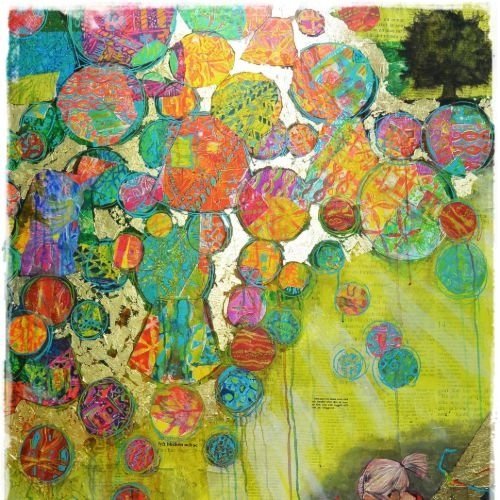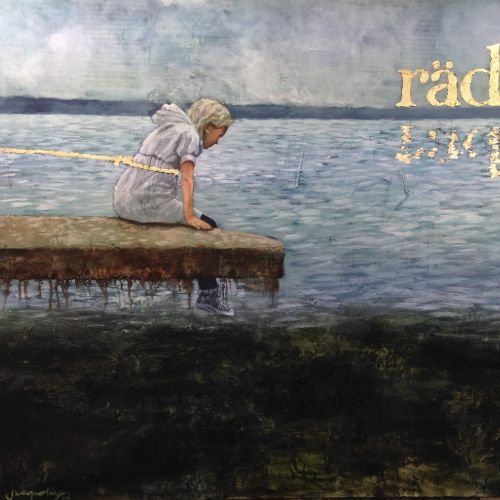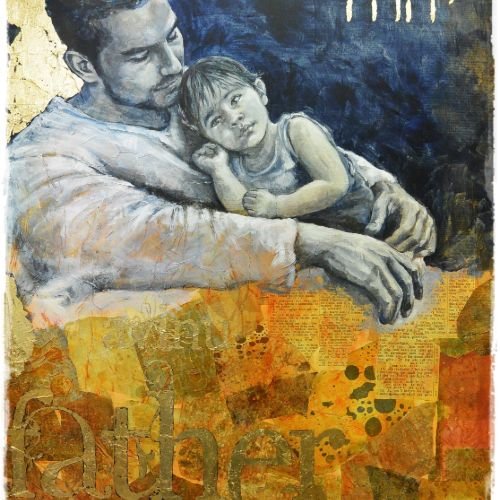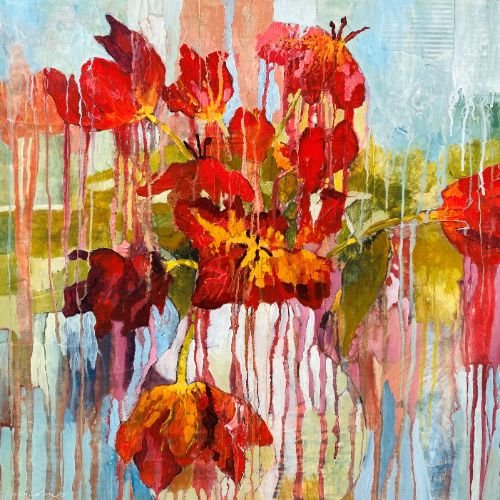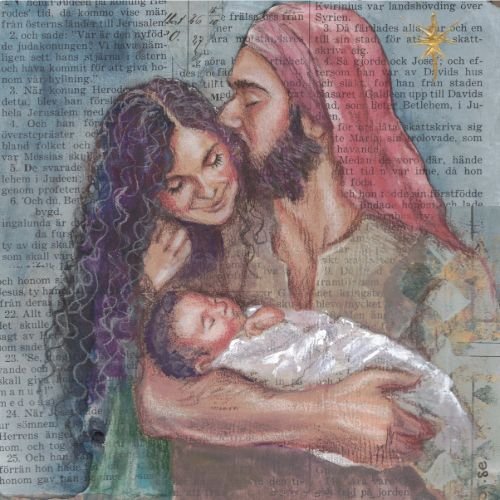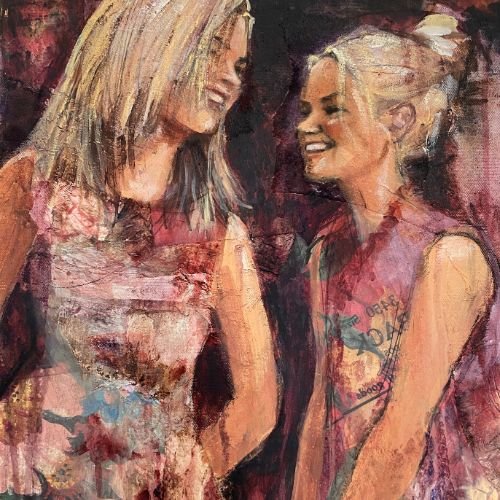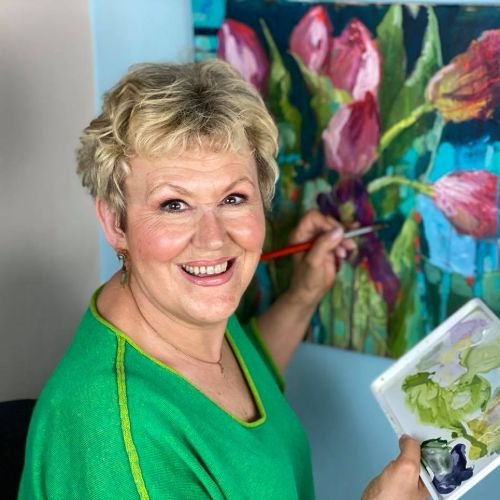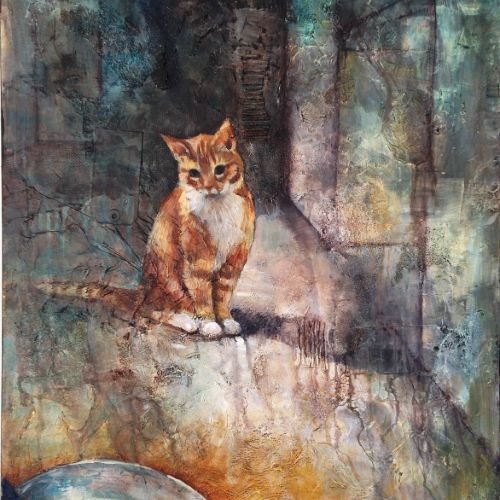How Jacqui's Creative Journey Started With a Tube of Red Lipstick
Updated Jan 2023: Maker’s Tech U is no longer open.
CLICK TO WATCH VIDEO ⬆
Maker’s Tech U Member Spotlight SERIES
Artist chat with Jacqui Holmgren, a drawing, fashion illustration and oil-painting artist living in Sweden. Jacqui thinks of herself as an inspirator, an encourager, as well as a tutor and apart from teaching the actual technical side of drawing and painting which is of course important, her main aim is to inspire her students to be as enthusiastic about creating as she is!
In this interview we chat about Jacqui's art journey, her love of fashion and textile art, tips she learned at university about ways to approach creating, overcoming creative blocks and her love of her adopted country of Sweden.
Podcast more your speed? Download the podcast and listen today!
How would you describe your art?
I think I would call it decorative. I studied as a fashion and textile designer and I have always loved textile prints and patterns, so I like to use a lot in my work. I also make my own stencils and stamps which keep my patterns unique to me, and I use them on fabrics too, not just paintings.
What is it about creating that lights you up?
Creating gives me energy and I have to be either on a project or researching for future projects the whole time. I teach textile design and I find that if I’m not creating myself at the same time, my creative energy starts to run dry. To be able to give out to others, I have to be painting, stitching, printing, or drawing. Often I do the same project I give the students myself, first. That way I’m buzzed and enthusiastic when I present it to them.
How is your personality reflected in what you make?
I’m quite a soft person, though I’m more extrovert than introvert. I love to wear bright colours and use them in my work too. I don’t like lots of black, or ugly figures or darkness in my work, so I try to paint uplifting images even if they are abstract.
How do you live a creative life?
By having stuff on the go the whole time. One of my favorite things to do is visit a museum or a garden or just walk through the streets of Stockholm taking photos, then going back to the hotel where my husband and I stay every few weeks to get away, and paint or draw. I have my kit with me and love to tear apart maps or brochures I’ve picked up and glue them as a base for a page, or a drawing. Because I work with creativity ( on my own work and teaching others) I am always doing something however small.
How would you describe your creative process?
I do a lot of research. One of the most useful things I learned at art school was how to begin a project by researching the source of inspiration. I usually tell my students, you can come up with a good idea if you’re lucky, but once you’ve tried it out, you have to think of another. Whereas if you give yourself some different ideas and research them, using Pinterest, library books, films, locations, your own photos, sketches, etc. then you’ve got enough resources on that idea to do a whole range of work.
Once I’ve got the research I try out different techniques and materials to see which ones appeal to me and do my best to create something interesting. I will make stamps with Lino tools, or stencils using patterns I’ve seen in museums, or photos I’ve taken of wrought iron gates on a walk, then make gelliprints using them on different papers. Then I use them as a basis for a painting.
What is your biggest obstacle when it comes to creating?
Time. I need to know I have time to sit for hours if necessary, and if I only have a couple of hours I can’t sit down and create - unless there’s a deadline to be finished with a piece of work, or a commission. Stress is horrible but it’s also a driving force for the procrastinator! I think a lot of artists are good procrastinators. Creating is such an emotional thing, and even seasoned artists find themselves making excuses not to go into their studio and just START.
Do you ever experience creative blocks and what do you do to overcome them?
I do. In one way this is where the research comes in. If you’ve got a creative block, write a list of subjects that sound interesting starting points. Eg. Venice, Monet, forests, boats, the color red, rococo, autumn, fossils, the Roman Empire, Jane Austen films, the seas and oceans of the world, Chinese porcelain, etc… then start researching.
Don’t stop till you’ve found pictures and ideas of a least 20 different aspects of each subject ( if you only have three and you’ve got a creative block, you’ll hate all three and give up. If you’ve got twenty there’s bound to be one that grabs you). Creative block sometimes means you need to do something completely different like reading a novel or going away for the day. Sometimes a cup of coffee helps. Other times you just need to plow on, just keep wasting paper till you do something you like. You can always rip it up and glue it onto something new.
How has your creative journey changed from when you first started creating?
I learned an interesting lesson in the early days. In my second year of art college (1978) I was blessed enough to get into St. Martins in London, I got a creative block - for about three months I hated every project I produced. I met a famous fashion illustrator from the fifties and sixties. He asked me how it was going and I said, not good, everything I do is rubbish.
He said, when you graduate and are out in the real world, there’s no time to be a primadonna… you have job to do and you do it, you stay up all night if you have to, but you deliver! I’ve thought about that many times and passed on his advice to my students. Many’s the time I’ve gone to bed, having not done anything I like, with a deadline of 10 am the next morning, and set my alarm for 4 am. Got up and drawn or painted like I was inspired through pure willpower. And delivered the work in time. I think I have become more disciplined as I’ve gotten older.
Has technology been a struggle for you in creating an online presence or selling your art online? In what way?
Yes absolutely - I’m old school and the idea of being able to learn techy stuff scared me, also everyone who tried to explain it to me lost patience because I didn’t understand. As for selling my art online, I had no idea how to go about it.
What has benefited you the most from being a member of Maker’s Tech U?
Oh goodness, it’s been amazing! I’d been a fan of Roben Marie for a while and loved her mixed media videos and courses. And I had a website, but it was very dated and I couldn’t add stuff myself I had to go through a webmaster, which was frustrating.
Being able to produce my own website, webshop, online courses, newsletters, become social media savvy ( still masses to learn there!) with my own color theme and style, and be able to add my own photos, text, etc. was fantastic. Roben- Marie is a genius, her step-by-step videos, and online support are exactly what I needed. She doesn’t talk computer-speak but explains it in a simple way for artists to understand.
How has your online presence changed since you joined Maker’s Tech U and applied what you have learned?
I’ve had some great feedback from people admiring my website, I’ve had commissions come in because people have found me and my work, and I feel more professional because I know my website is up to date. I love that she adds more and more tutorials to the MTU website, and has her finger on the pulse of what’s new and trending in social media.
What advice would you give to other creatives struggling to move forward for fear of technology?
Well to definitely try MTU. I’m 64, and if I can learn then anyone can. It’s the videos that you can pause and go to your Squarespace site and do what she says, then go back and see the next step at your own pace that is so helpful. I designed and produced my own website, webshop, and blog in four months and I only worked in the evenings after work. Lots of help from Roben- Marie who was at the other side of both the North Sea and the Atlantic but answered me always been within either minutes or max. a couple of hours.
What changes would you like to make in your creative journey over the next six months?
More online courses I think. Perhaps on Teachable this time, Roben Marie has video tutorials on that too.
What fun activity comes second in your life to creating?
Watching old movies, classics - I can quote the scripts ( nerd) !
Mentioned in the interview: Gustav Klimt and Shirley Trevena.
Check out all the MTU Member Spotlight Interviews HERE!
Jacqui Holmgren
I moved to London to study Fashion and Textile design at St. Martin’s School of Art. Three years later I graduated and moved immediately to Sweden in 1980. I started my own illustration firm and I’ve worked as an artist and freelance illustrator since then.
I need to draw or paint every day to feel good, just to sit down and play for half an hour enriches my life.
I think of myself as an inspirator, an encourager, as well as a tutor and apart from teaching the actual technical side of drawing and painting which is, of course, important, my main aim is to inspire my students to be as enthusiastic about creating as I am!


